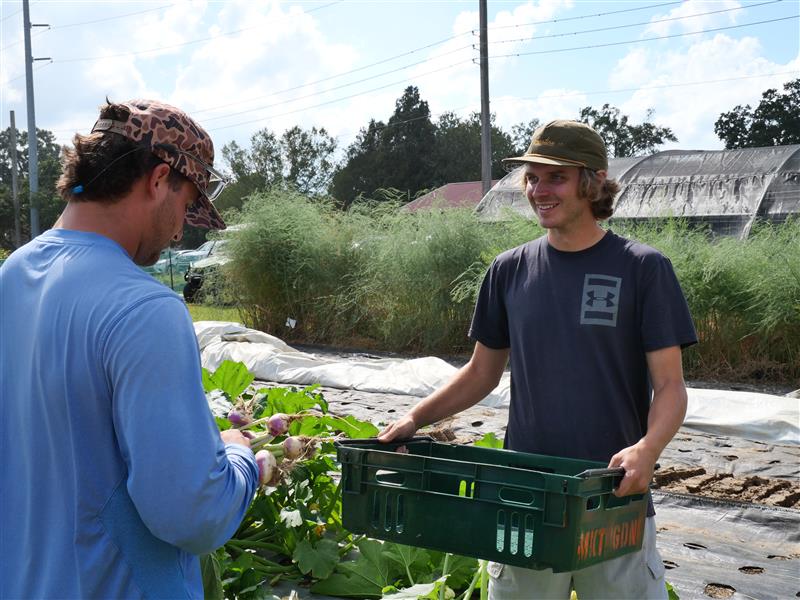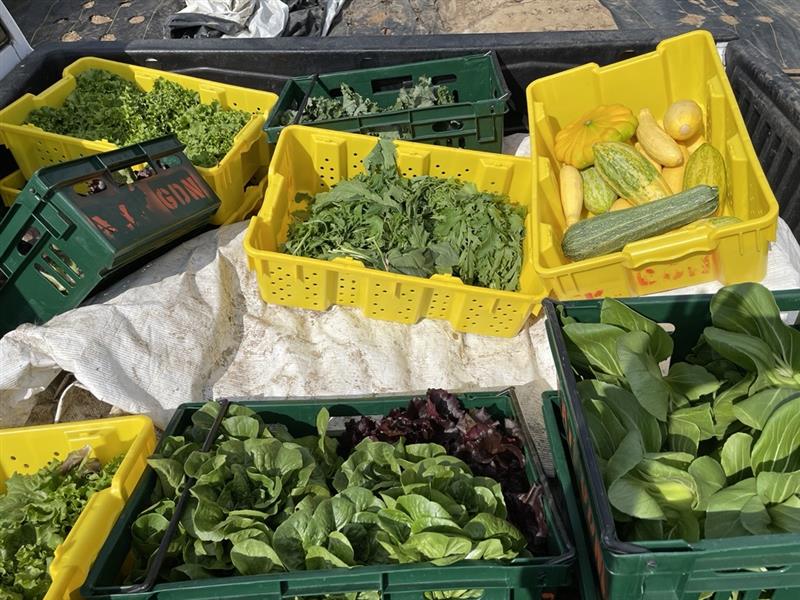Growing Connection: LSU’s Hands-on Approach to Community Agriculture
November 13, 2024

HORT 4083 students harvesting vegetables that they grew over the semester.
Bridging the Gap and Laying Roots
For some, the agricultural industry is one that is distant, almost foreign. It exists
beyond the reach of many of our daily lives. For some, food simply appears on the
shelves of grocery stores, packaged, labeled, and ready to be taken home. The process
that brings it there - from the fields and farms, where it is grown and harvested
- remains invisible. In the College of Agriculture at LSU, faculty and staff make
it a priority to give students hands-on experiences, helping shape agriculturists
in all parts of the field and appreciate the challenging work behind their dinner
every night.
Dr. Carl Motsenbocker is no stranger to this disconnect between consumer and producer.
As a professor in the School of Plant, Environmental and Soil Sciences, Motsenbocker
teaches HORT 4083 (Principles and Practices in Olericulture) where he educates students
on the practice of horticulture and olericulture. Motsenbocker gives students the
chance to learn by doing, as well as a further appreciation for those who grow and
harvest our food.
Olericulture is the science of growing vegetables and other non-woody plants for food.
Through HORT 4083, students spend time learning about soil health, organic practices,
and environmental impacts on food crops. Students spend lab time at the Hill Farm
Teaching Facility, gaining a life-long skill of market gardening. Motsenbocker highlights
just how easy it is to grow an abundant plot of vegetables. Students plant cool season
vegetables such as lettuce, bok choy, turnips, and squash.

Growing Knowledge and Community
In this course, the goal is not only to give students hands-on experience of learning
but also to instill a sense of service and community engagement. The LSU Food Pantry
on campus is a key partner of the Hill Farm community garden, providing a real-world
connection between sustainability and food security. As a part of HORT 4083, students
grow and harvest vegetables using sustainable practices and gaining practical knowledge
in olericulture. The produce that is grown is then donated directly to the LSU Food
Pantry, offering students an opportunity to address food insecurity on campus. This
donation not only helps provide fresh, nutritious food to those in need but also emphasizes
the value of local grown produce and importance of community partnerships. Last year,
the Hill Farm Facility produced over 3000 lbs. of produce, of which 2,646 lbs. were
donated to the food pantry!
Isabella Frank is an AgCenter extension associate working with the School of Plant,
Environmental and Social Sciences and is a teaching assistant for this course. She
pointed out that, “a number of students Dr. Motsenbocker has taught go on to start
actual farms or horticulture-related businesses. (Loup Farms, Double Portion Farms,
Blazing Star Farms, to name a few).” Frank believes that labs where students are tasked
with maintaining a garden space allow them to gain the most valuable skills within
their education.

Vegetables Harvested from the Hill Farm Facility
Harvesting Connections
In a world where food often seems like a product that simply appears on shelves, courses like HORT 4083 at LSU do more than teach the technical skills of growing food – they foster a deeper connection to the Baton Rouge community and the demanding work that goes into our every meal. By giving students the opportunity to contribute to the LSU Food Pantry, the program highlights the connection between sustainability, education, and service. Whether students start their own farms, pursue horticultural careers, or appreciate their food origins, they leave with a deeper understanding of the agricultural process and the importance of supporting the people in their local communities. As Dr. Motsenbocker, Frank, and faculty within the School of Plant, Environmental and Soil Sciences continue to inspire the next generation of agriculturalists, their work ensures that the future of food production is not only more sustainable but also more deeply connected to the communities around them.